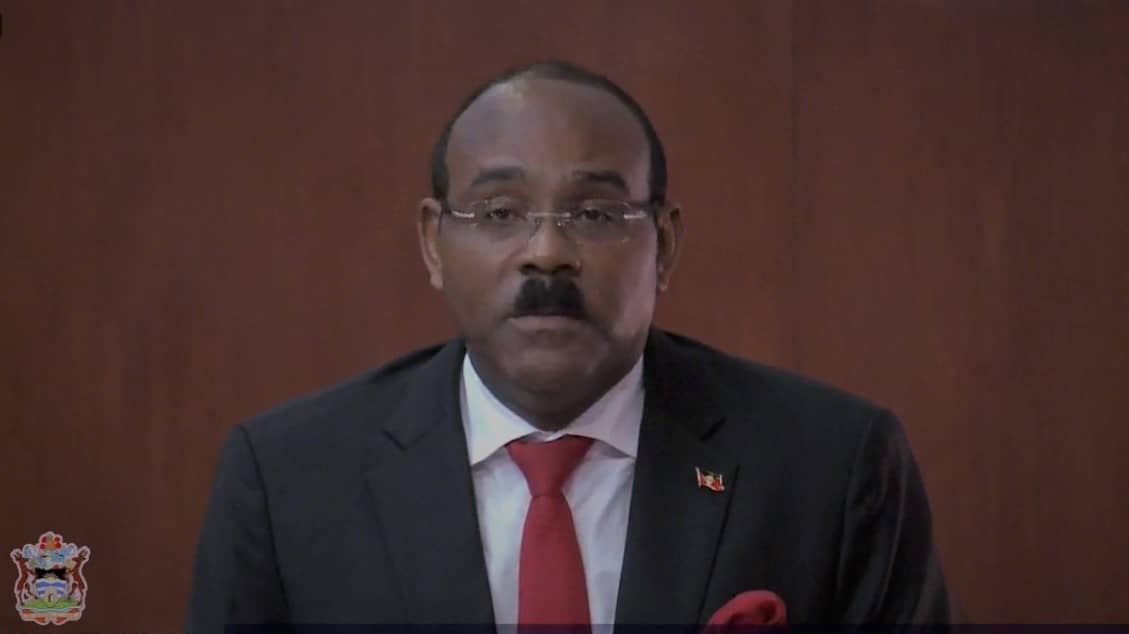

Prime Minister Gaston Browne introduced a number of new taxes and announced measures to boost the collection of existing taxes when he presented the 2019/2020 budget in parliament this morning.

There will be a tax on sugary beverages and a tax on financial institutions.
Browne said the tax on sugary drinks is necessary because Antigua and Barbuda is plagued by life-threatening, non-communicable diseases, such as diabetes and hypertension.
“Too many of our people die too early from these diseases, that start at an early age, even though they might only manifest themselves in later life.

Certain foods and drinks, particularly sugary beverages, contribute greatly to these diseases,” he told fellow lawmakers
He said the expectation for the revenue-neutral tax is that it “will help to reduce the consumption of sugary beverages and encourage our people to make healthier choices.”
The tax on financial institutions will be to fund the UWI Five Islands Campus.
Browne who is also finance minister said UWI’s fourth landed campus requires a stable and consistent flow of funding in order to be sustainable and successful.
But he said the new tax will be just one way of helping to pay for the campus as the
“One of these options is a 10% tax on net profits of telecommunications companies, financial institutions – specifically banks and insurance companies and the country’s sole petrol distribution company, WIOC,” he announced.
The prime minister told said in his near
He is hoping that the companies required to contribute to this tax will regard it, not only as an opportunity to contribute to the growth and development of Antigua and

The 2019/2020 budget also contained measures to improve the collection of existing taxes.
The speech also contained a word of caution to companies and individuals not paying their taxes.
“Any person or company, who reneges on these payments,
They should be warned now that our government will not allow this behaviour to continue,” the prime minister said to applause.
“It is not fair; it is not just, and it is not acceptable. Our government, as the wardens of the interests of all the people, will clamp down on the excesses of the few,” he added.
The country’s leader also announced to today that concessions to businesses which cost the state 330 million dollars in lost revenue will become a thing of the past.
“This $330 million mainly represents waivers of customs duties, ABST, Revenue Recovery Charge, Corporation Tax, Unincorporated Business Tax, and Stamp Duties. To secure fiscal balance and stability going forward, these levels of concessions cannot continue,” Browne announced.
Measures were also implemented this year to collect the Entertainment Tax.
Tax revenue is projected to be $751.2 million or about 81 per cent of recurrent revenue.
Non-tax revenue makes up the remaining 19 per cent of recurrent revenue and is estimated at $181 million in Budget 2019.
Direct taxes are expected to yield $116.1 million in 2019.
The main contributors to direct tax revenue are the Corporate Income Tax, the Property Tax and the Unincorporated Business Tax.
The Corporate Income Tax is projected to yield $77.5 million in 2019, while the Property Tax is expected to yield $28 million.
The Unincorporated Business Tax is estimated to yield $9.4 million, which is $2.4 million above the amount collected in 2018.
Indirect taxes are expected to yield $635.1 million, which is about 85% of tax revenue. A total of $285.3 million or 45% of the revenue from indirect taxes will be generated from the ABST. This represents a 10% increase over the ABST yield for 2018.
Revenue from the import duty is budgeted at $102.4 million, while the Revenue Recovery Charge is projected to yield $90.2 million in 2019.
Debate on the 1.2 billion dollar budget begins on January 28, 2019.
Advertise with the mоѕt vіѕіtеd nеwѕ ѕіtе іn Antigua!
We offer fully customizable and flexible digital marketing packages.
Contact us at [email protected]














Writer why not emphasize the fact that the Sugary tax being revenue neutral means its not expected to pose any additional burden on tax payers? What ever increase in sugary foods will see a decrease in more healthy ones
The tax on financial institutions is pegged to last only two years. It calls for an investment to ensure we have high level skills which could aid some of these financial corps in getting better skilled persons. Will they revolt against it or embrace it since its for their long term benefit?
@tenman, let me say i am in support of the tax measure on sugary goods .its one i have advocated for a while back . in fact most of the other island have already implemented that measure a few years back . Moreover i do believe that accompaning that tax should be an excise tax on alchoholic beverages and tobacco . on the other hand tenman u cant assume that because a tax have no impact on revenue it would not create any hardship . my brother we economist classify goods into 3 CATEGORIES . GIFFEN , INFERIOR, AND NORMAL GOODS . these classification is base on the income and substitution effect of a price change . now for a giifen good an increase in price causes quantity demanded to increase . simply because of the lack of available substitutes. an inferior good is one tha consumer consume more of the lesser their income . hence a giffen good is an inferrior good without substitutes . however other inefrior goods do have substitute but because some consumer income is so low they consume that particular good. now ten man . there is a lot of us out there that consume these sugary products simply because we cannot affors the healthier ones . hence that make most sugary item an inferior good for a vast amount of this populatio. my brother even a ten precent drop in price of healthy foods will not cut it .most of us will still not be able to eat healthy . so guess what those of us on low income will suffer as these inefrior sugary product will now be more expensive . while at the same time the money makers who already can afford to eat healthier is going be made bettet off . now seeing that i support the tax then i guess u may be asking how do we implement such taxes withouyt increasing burden on the vulnerable . my answer to you is that i have always advocated for a tax system where everyone pays , all item taxed and then having identified the vulnerable ( what we call tatgetting) we issue them a monthly cheque . under that system there would be less loopholes and we can ensure that measures implemented for the poor asist the poor and not everyone. even social security would benefit if everyone pays from the first dollar earned . by way tenman i look forward to reading ur views on the windfall tax .
LLET ME REPEAT MYSELF NO NEW TAXES UNTIL THEY ARE WRITTEN INTO LAW..
What good is an increase in revenue in the minister of education will piss away 10 million every year on some boat anchors that don’t work or some other pet project that these clowns dream up in a barber shop
What’s the use of collecting more taxes if you’re gonna just give max 8 million or rent a building from a comrade for 1 million dollars annually
What a joke country with joke government
@lastone. There will and always be a certain degree of corruption , wastage , negligence. recklessness and ineffeciencies within any government system . The question should be how do we reduce that degree . in refrence to ur points i would suggest thst it should be clearly legislated and articulated that no department sjoulf enter into contractual obligation without the involvement of the office of the fianacial secretary. and that of the Attorney General . on the otther hand it is wrong for u to suggest that because there is some degree of watage or inefficencies , recklessness etc that we should delay implementing inportant tax measures. why cant we implemement these measures while simultaneously trying to improve procurement pocedures and tax compliance?
THIS GOVERNMENT IS A WARDEN OF THEIVES & & PICKPOCKETS OF THE PEOPLES MONEY & LANDS. GRABBERS & BLATENT HUNGRY MONEY LOOKERS WITHOUT WHO’S WATCHING IN THE VIDEO CAMERAS OF A&B. TIME WILL TELL.
Comments are closed.